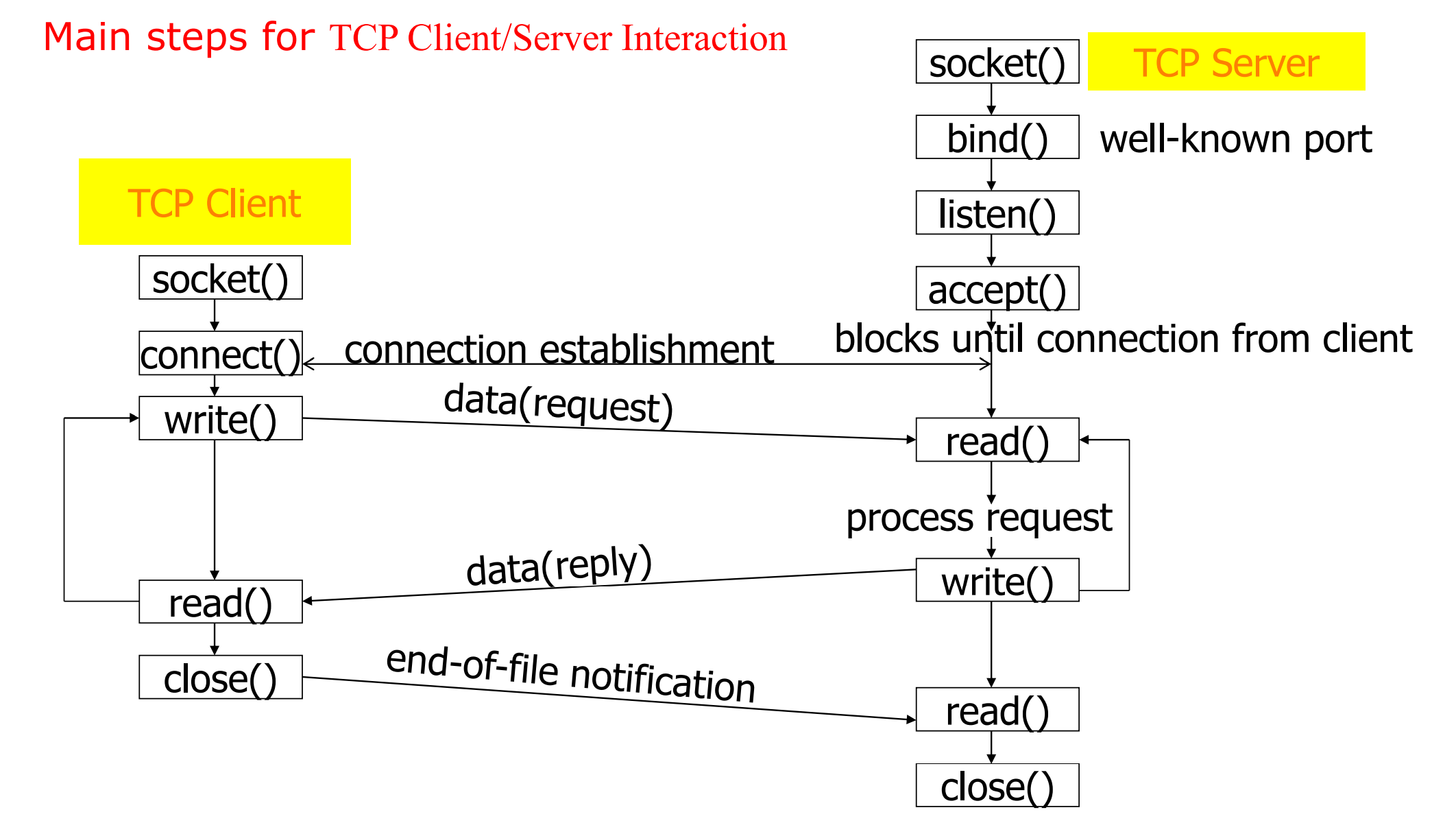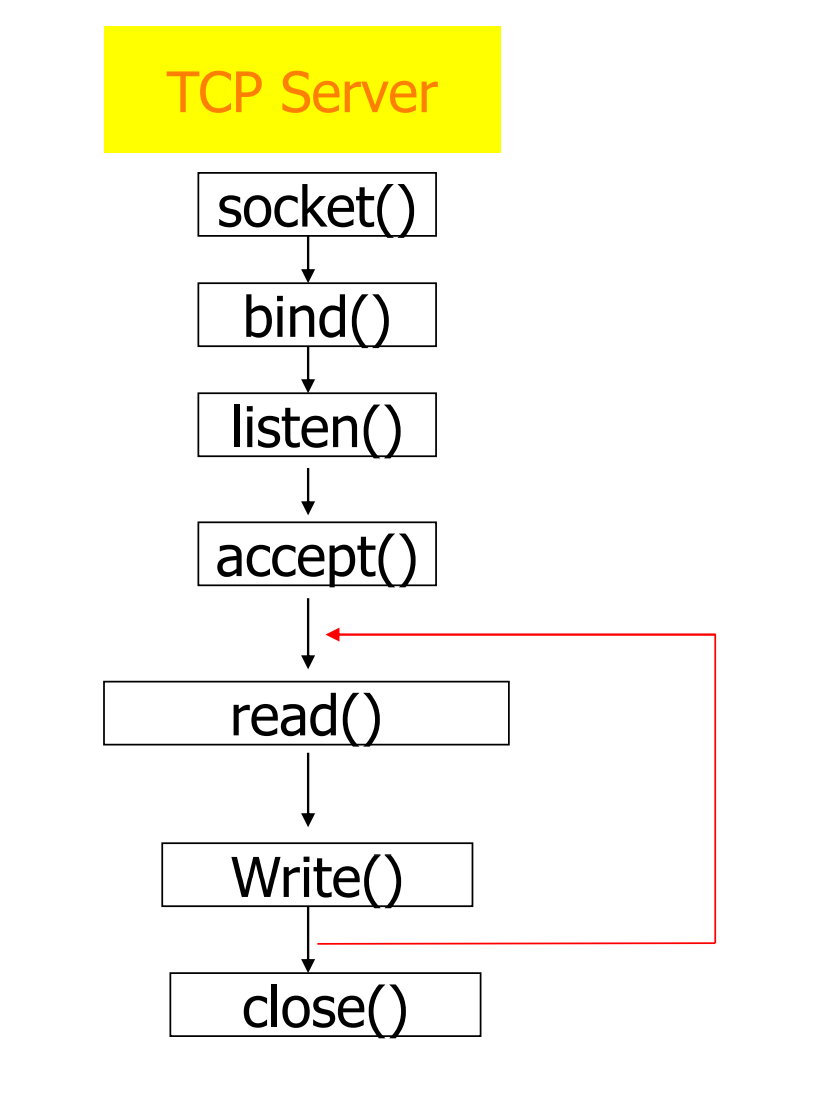
实现多条信息收发

Windows Server
#pragma comment(lib, "ws2_32.lib")
#include <iostream>
#include <cstdlib>
#include <string>
#include <winsock2.h>
using namespace std;
int main()
{
//初始化模块,仅Windows系统需要
WORD sockVersion = MAKEWORD(2, 2);
WSADATA wsdata;
if (WSAStartup(sockVersion, &wsdata) != 0)
{
cout << "Initialize Error!"<<endl;
exit(-1);
}
//建立socket
SOCKET s = socket(AF_INET, SOCK_STREAM, IPPROTO_TCP);
if (s == INVALID_SOCKET)
{
cout << "socket Error!" << endl;
exit(-1);
}
sockaddr_in ss;
memset(&ss, 0, sizeof(ss));
ss.sin_family = AF_INET;//IPv4
ss.sin_port = htons(6666);//port No.
ss.sin_addr.s_addr = inet_addr("127.0.0.1");
//ss.sin_addr.s_addr = htonl(INADDR_LOOPBACK);
//bind:socket绑定IP地址和端口用于监听
if (bind(s, (sockaddr*)&ss, sizeof(ss)) == SOCKET_ERROR)
{
cout<<"Bind Error!"<<endl;
exit(-1);
}
//listen:设定可同时排队的Client最大连接个数
if(listen(s, 1) < 0)
{
cout<<"Listen Error!"<<endl;
return -1;
}
cout<<"Server is running..."<<endl;
for(;;)
{
//accept:等待客户端链接
sockaddr_in clnt_addr;
int clnt_addr_size = sizeof(clnt_addr);
int fd = accept(s, (sockaddr *) &clnt_addr, &clnt_addr_size);
//int fd = accept(s, (sockaddr*)NULL, NULL);
if (fd < 0)
{
cout << "Accept Error" << endl;
exit(-1);
}
else
cout<<"Connected to Server:"<<fd<<endl;
string msg = "Hi, Client";
send(fd, msg.c_str(), msg.length(), 0);
cout << "Sending:\" " << msg << "\" to Client..." << endl;
while(1)
{
cout << "Waiting for Clients request..." << endl;
string message;
int jud = recv(fd, message.to_cstr(), 256, 0);
if (jud < 0)
{
cout<<"Receive Error!!!"<<endl;
break;
}
if (message == "quit")
{
cout << " Bye-bye " << fd << "!" << endl;
closesocket(fd);
break;
}
else
cout << " Received by Client: " << message << endl;
}
}
closesocket(s);
return 0;
}Windows Client
#pragma comment(lib, "ws2_32.lib")
#include <iostream>
#include <cstdlib>
#include <string>
#include <winsock2.h>
#include <string>
using namespace std;
int main()
{
//初始化模块,仅Windows系统需要
WORD sockVersion = MAKEWORD(2, 2);
WSADATA wsdata;
if (WSAStartup(sockVersion, &wsdata) != 0)
{
cout << "Initialize Error!"<<endl;
exit(-1);
}
SOCKET s = socket(AF_INET, SOCK_STREAM, IPPROTO_TCP);
if (s == INVALID_SOCKET)
{
cout<<"Invalid Socket!"<<endl;
exit(-1);
}
sockaddr_in ss;
memset(&ss, 0, sizeof(ss));
ss.sin_family = AF_INET;//IPv4
ss.sin_port = htons(6666);//port No.
ss.sin_addr.s_addr = htonl(INADDR_LOOPBACK);
if(connect(s, (sockaddr*)&ss, sizeof(ss)) == SOCKET_ERROR)
{
cout<<"Connect Error!"<<endl;
closesocket(s);
exit(-1);
}
string message;
if(recv(s, message.c_str(), 256, 0) > 0)
{
cout<<"Successfully Connected to Server: ";
cout<<message<<endl;
}
while(1)
{
string msg;
cout<<"Please input your message:";
getline(cin, msg);
int send_len = send(s, msg.c_str(), msg.length(), 0);
if(send_len < 0)
{
cout<<"Sending Error!!!"<<endl;
break;
}
else if(msg == "quit")
{
cout<<"See you next time, bye!"<<endl;
closesocket(s);
break;
}
}
return 0;
}Linux Server
#include <stdio.h>
#include <sys/types.h>
#include <sys/socket.h>
#include <stdlib.h>
#include <unistd.h>
#include <netinet/in.h>
#include <ctype.h>
int main()
{
//建立socket
int s = socket(AF_INET, SOCK_STREAM, IPPROTO_TCP);
if (s < 0)
{
printf("Socket Error!\n");
exit(-1);
}
struct sockaddr_in ss;
memset(&ss, 0, sizeof(ss));
ss.sin_family = AF_INET;//IPv4
ss.sin_port = htons(6666);//port No.
//ss.sin_addr.s_addr = inet_addr("127.0.0.1");
ss.sin_addr.s_addr = htonl(INADDR_ANY);
//bind:socket绑定IP地址和端口用于监听
if (bind(s, (sockaddr*)&ss, sizeof(ss)) < 0)
{
printf("Bind Error!\n");
exit(-1);
}
//listen:设定可同时排队的Client最大连接个数
if(listen(s, 1) < 0)
{
printf("Listen Error!\n");
return -1;
}
printf("======Server is running...======\n");
for(;;)
{
//accept:等待客户端链接
int fd = accept(s, (struct sockaddr*)NULL, NULL);
if (fd < 0)
{
printf("Accept Error!\n");
exit(-1);
}
else
printf("Client %d, welcome!\n", connfd);
char msg[32] = "Hi, Client";
//send(fd, msg.c_str(), msg.length(), 0);
write(fd, msg, sizeof(msg));
printf("Sending:\"%s\" to Client\n", msg);
while(1)
{
printf("Waiting for Clients request...\n");
char message[32];
memset(message, 0, sizeof(message));
//int jud = recv(fd, message, sizeof(message), 0);
int jud = write(fd, message, sizeof(message));
if (jud < 0)
{
printf("Receive Error!!!\n");
break;
}
if (strcmp(message, "quit") == 0)
{
printf("Bye-bye %d!", fd);
close(fd);
break;
}
else
printf(" Received by Client: %s", message);
}
}
close(s);
return 0;
}Linux Client
#include <stdio.h>
#include <sys/types.h>
#include <sys/socket.h>
#include <stdlib.h>
#include <unistd.h>
#include <netinet/in.h>
#include <ctype.h>
int main()
{
int s = socket(AF_INET, SOCK_STREAM, 0);
if (s < 0)
{
printf("Socket Error!\n");
exit(-1);
}
struct sockaddr_in ss;
memset(&ss, 0, sizeof(ss));
ss.sin_family = AF_INET;//IPv4
ss.sin_port = htons(6666);//port No.
ss.sin_addr.s_addr = htonl(INADDR_LOOPBACK);
if(connect(s, (sockaddr*)&ss, sizeof(ss)) < 0)
{
printf("Connect Error!\n");
close(s);
exit(-1);
}
char message[32];
memset(message, 0, sizeof(message));
if(write(s, message, sizeof(message)) > 0)
printf("Successfully Connected to Server: %s", message);
while(1)
{
char msg[32];
printf("Please input your message:");
gets(msg);
int send_len = send(s, msg, sizeof(msg));
if(send_len < 0)
{
printf("Sending Error!!!\n");
break;
}
else if(msg == "quit")
{
printf("See you next time, bye!\n")
close(s);
break;
}
}
return 0;
}Python Server
import socket
try:
s = socket.socket(socket.AF_INET, socket.SOCK_STREAM)
except Exception:
print("Socket Error!")
# listen port
try:
s.bind(('127.0.0.1', 7777))
except Exception:
print("Bind Error!")
try:
s.listen(5)
except Exception:
print("Listen Error!")
print('Server is running...')
while True:
try:
sock, addr = s.accept()
except Exception:
print("Accept Error!")
print("Connected to Server: ", addr) # (Id, port)
msg = "Hello Client!"
sock.send(msg.encode())
print("Sending \"", msg, "\" to Client...")
while True:
print("Waiting for Clients request...")
message = sock.recv(256).decode('utf-8')
if message == "quit":
print("Bye-bye", addr, "!")
break
else:
print(" Received by Client: ", message)
sock.close()
exit(0)
Python Client
import socket
try:
s = socket.socket(socket.AF_INET, socket.SOCK_STREAM)
except Exception:
print("Socket Error!")
try:
s.connect(('127.0.0.1', 7777))
except Exception:
print("Connection Error!")
message = s.recv(256).decode('utf-8')
print(message)
while True:
msg = input("Please input your message: ").strip()
if not msg:
continue
s.send(msg.encode())
if msg == "quit":
print("See you next time, bye!")
s.close()
break
exit(0)

